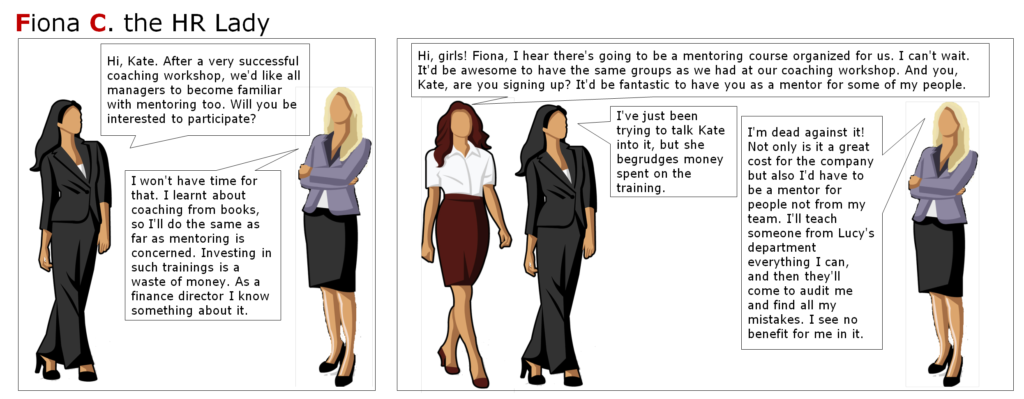
Mentoring is a long-term relationship between a person with tremendous baggage of experience and knowledge (mentor) who supports the development of a person with less experience or shorter period of employment (mentee). Mentoring can be both an informal relationship and a formalized program. It’s one of the most effective (focused on practice) methods of learning the aim of which is to develop a mentee’s potential and prepare them for any forthcoming challenges. In contrast with coaching, it is usually carried out within a longer time perspective – from 1 to 3 years.
What does mentor do?

Experts at a given area, field or company who play the role of an internal adviser can be mentors. It would be good if a mentor was considered an authority in their environment (i.e. cream of the crop in their company) and, first and foremost, was interested and ready to support less experienced people in raising work-related and interpersonal competencies. In a formalized process, mentors act on the basis of previously developed methods. Moreover, the scope of a mentoring relationship narrows down to professional matters and concentrates on developing a mentee’s career. A mentor is a guide who builds a relationship with a mentee on mutual respect and trust.
A mentor helps a mentee discover and develop his/her potential. Mentors inspire and encourage into action. They help a mentee to reflect on his/her action and set goals. They strengthen mentees in walking along the chosen career path.
Mentoring vs. coaching

When a coach, in contrast with a mentor, supports development of an employee, he/she works in such a way so that a coachee could independently choose his/her goals and the ways to achieve them. A coach’s task is to offer assistance while transferring general intentions into specific projects and support the client during their realization.
A mentor, on the other hand, is someone who also supports but acts in a more directive way. They give guidelines, teach and sometimes allocate tasks and assess their realization.
To sum up, mentoring is applied in order to:
- identify and analyze a mentee’s strengths and weaknesses
- support a mentee in challenges they undertake
- discover and develop a mentee’s potential and internal motivation
- develop a mentee’s business awareness
- discover an employee’s ability to influence others
- determine a career path and analyze threats and opportunities
- develop interpersonal and social competencies
Glossary:
- tremendous – olbrzymi
- forthcoming – oczekujący, nadchodzący
- to carry out – przeprowadzić
- first and foremost – przede wszystkim
- mutual – wzajemny
- guidelines – wskazówki
- to assess – oceniać
- to undertake – podejmować się
- awareness – świadomość
- threat – zagrożenie
Idiom of the month:
cream of the crop
meaning:
the best employees in a company
in Polish:
Najlepsi pracownicy w firmie.
Czołówka pracowników.
examples:
- After a few years of hard work I’ve become the cream of the crop.
- I hear they’re taking
Exercise:













